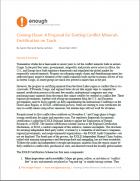
Tremendous strides have been made in recent years to cut the conflict minerals trade in eastern Congo. In the past four years, governments, nonprofits, and private sector actors in Africa, the U.S., and Europe have built regulatory frameworks and stimulated the global market for responsibly sourced minerals. Progress on reforming supply chains and demilitarizing mines has addressed many negative elements of the conflict minerals trade and the economic drivers of war in eastern Congo, as armed groups are much less present in mines than in the past.
However, the progress in certifying minerals from the Great Lakes region as conflict-free is at a crossroads. If Rwanda, Congo, and regional states do not take urgent steps to complete the mineral certification process in the next few months, multinational companies may stop purchasing many minerals from the region that cannot credibly be certified as conflict-free. These regional governments, together with strong encouragement from the U.S. and European governments, need to focus urgently on fully implementing the International Conference on the Great Lakes Region, or ICGLR, certification process. States are starting to issue certificates for easy-to-certify mines using ad hoc measures, but interim steps will not work for all mines.
Rwanda issued its first conflict-free certificate on November 6,and Congo plans to begin issuing certificates for mines and exporters soon. The regulatory framework for minerals certification is called the ICGLR Regional Initiative against the Exploitation of Natural Resources, or RINR. The mineral certification scheme, known as the Regional Certification Mechanism, or RCM, a central component of this initiative, remains incomplete. The structures for ensuring independent third-party audits, overseen by a committee of electronics companies, regional governments, and nongovernmental organizations—the ICGLR Audit Committee—are not yet finalized. The fourth part of the process, the ICGLR Independent Mineral Chain Auditor, tasked with ensuring transparency and thwarting fraud and smuggling, has not been assembled. Without the audits and independent oversight mechanisms, minerals from the region cannot be fully certified as conflict-free, purchased as such, and directed toward the broader global market.
The ICGLR Certification Scheme has four main components:
1. Mine inspections and traceability: Mines get green, yellow, or red status as “conflict- free” or not, and minerals are placed in “bag and tag” or similar tracing systems. Thus far, 55 mines have green status, and approximately 500 mines have “bag and tag” systems. Minerals are tracked from mine to export. (Status: in place/developing).
2. Information database: Mineral tracking via a regional database (Status: in development).
3. Audits: Independent third party audits, overseen by audit committee made up of electronics companies, regional states, and NGOs (Status: not yet finalized).
4. Independent monitoring: Independent Mineral Chain Auditor, or IMCA, to check forsmuggling and fraud and to sanction smugglers (Status: not in place). A series of temporary, ad hoc solutions currently address some immediate needs of companies seeking conflict-free minerals. To date, electronics and other companies have relied on the “bag and tag” system, run by the tin and tantalum industries, to purchase minerals from Congo and the region. This system, implemented on a wide scale in Rwanda and in some parts of Congo, deserves praise for being a good first step, but the system remains opaque and it does not guarantee conflict-free minerals. Its incident reports are not made public, numerous cases of smuggling have been documented within the system, and there is no uniform, independent system for noncompliance.
Congo and Rwanda have also used private consultants paid by independent third parties to attempt to certify the first mines and exporters, namely the Solutions for Hope mines in Congo and the large-scale mines in Rwanda. Ad hoc solutions like these, while preferable in the absence of more robust measures, will not work for all mines and cannot indefinitely provide electronics and other end-user companies with the credible assurances that they need to ensure they are purchasing conflict-free minerals on a large scale. An interim solution may be necessary in the short term, but it must meet international due diligence standards, and should be buttressed by Rwanda and Congo publishing production data of their mines. Moreover, a sustainable ICGLR regional solution must be found for the long-term. Without this assurance, the companies may stop buying many minerals from Rwanda, Congo, and/or the region.

